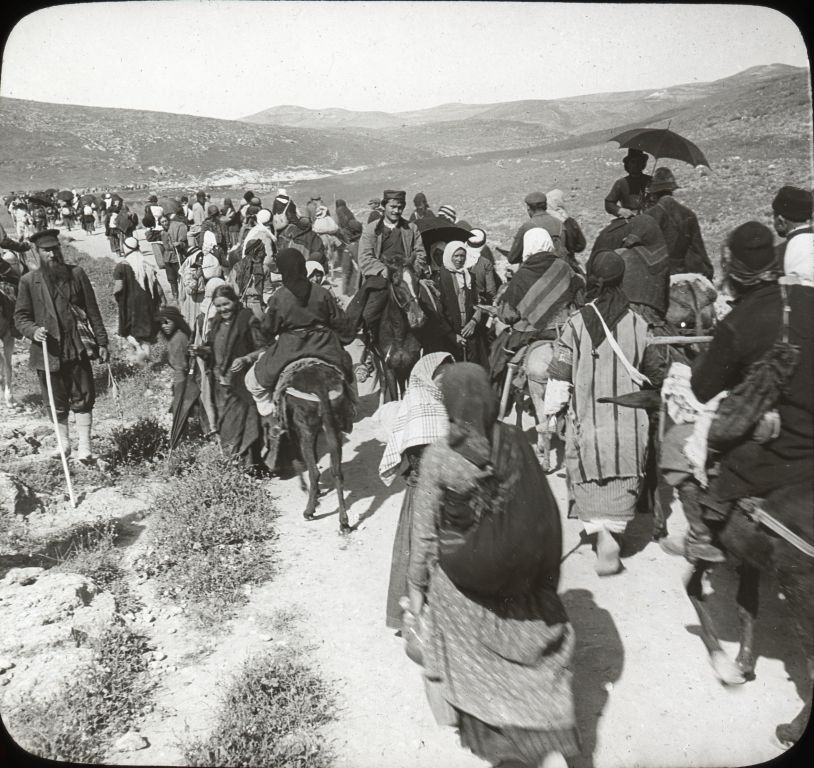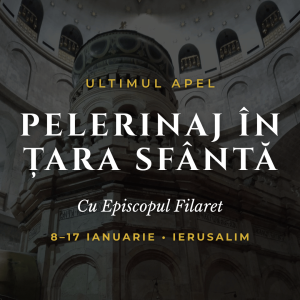What You Didn’t Know About the Attachment “Pilgrim” to Orthodox Names.

Being a pilgrim to any holy place was always greatly revered in the Orthodox Church. One can only bring to mind that so sweet book about a spiritual wanderer called “The Way of a Pilgrim” (Read it if you haven’t already!)
Pilgrimages were made to near and far places and most importantly to the Holy Land surrounding Jerusalem.
Saints like St. Basil the Great and his brother St. Gregory of Nyssa are only a couple of early Church Fathers who are recorded as having made pilgrimages to the Holy Land. St. Alexander (later Bishop of Jerusalem) made his way to Jerusalem at the very beginning of the Third Century when most of the shrines of the Holy Lands were covered over by pagan temples.
Starting from the days of Turkish domination, Greeks often called people who made such a pilgrimage as “Hatzis” (“Hatzides” plural). The word comes from the Arabic “Hatz” which means a pilgrimage to a holy place (and is also used by Muslims for their only places).
Often, (even up to the present time) people were commemorated with the attachment “the pilgrim” to their name after such a pilgrimage
In older times, it was truly a great feat for someone to go to the Holy Lands from far away places like Russia and Greece. These pilgrimages were by foot and ship. It was considered a greater blessing to complete the entire pilgrimage by foot and not by ship. Not everyone returned (some fell in love with the Holy Lands and never left and others left to the “Jerusalem above” either on the voyage or once there). There exist many wonderful stories about people leaving their last breath at a pilgrimage. Especially endearing is the story of a man and his wife from Russia who arrived at the Holy Sepulchre. The man went inside the Most Holy Tomb of Christ and shouted, “The Holy Light” and immediately fell asleep in the Lord. His wife then went inside and also proclaimed, “The Holy Light” and also entered into the life of the Holy Light of the eternal kingdom immediately. To the pilgrims of older times, it was considered a blessed death to enter the eternal life while in the Holy Land.
Pilgrims were given the wish “May you go with the prayers of St. Helen (who again discovered and founded most of the shrines of the Holy Land) and may you return with the blessing of St. Constantine”. Pilgrims often offered a banquet to their friends and relatives before leaving, asking forgiveness from all before beginning their pilgrimage and receiving their blessings.
At such banquets, Christians gave some amount of money to help the future pilgrims, to pay for candles to be lit, for almsgiving both for the travelers and those who served in the holy places, or to pay for some cross or other “blessing” from the Holy Land.
The pilgrims were seen as people who had dedicated their lives to Christ since they sacrificed so much to make that journey! (And so many today even disdain such a pilgrimage preferring to spend their money on frivolous vacations).
When the pilgrims were setting off, the priest of their village together with pilgrims who had already completed at some time such a peregrinate accompanied the future pilgrims a little way out of the village on the road to the holiest of places.
As the pilgrims came closer to their destination, the roads were filled with Christians from different places and countries all having as their final goal the Most Holy Tomb of Christ.
For those who returned from the pilgrimage, there was a wonderful reception with the ringing of bells in their village. In the villages of Cappadocia of Asia Minor, the “pilgrims” were exceptionally careful to be just in all things as they were dedicated to God. In their business transactions, the pilgrims wouldn’t weight any goods they were selling or buying for fear of being unjust and unwantedly stealing. Instead, they would make someone else (even if it was the customer) weigh the goods, or if that wasn’t possible, after attempting to honestly weigh the goods, the pilgrim seller would add a couple of handfuls of the goods just to be sure.
For those pilgrims who lived up to their reputation, it was often said that “they truly left their sins behind” having gone on the sacred journey. For those who didn’t live up to the expectations, the expression “not even the Jordan washed them clean” was often heard.
When a pilgrim reached the end of his life, his body was washed and dressed by other pilgrims. Candles from Jerusalem were lit as his body lay in state.
Orthodox Christians put the things of God first in their life. One such Godly way of living was the pilgrimage to holy places and especially to the Holy Land which would alter the pilgrim’s way of life forever.






Grory to God!